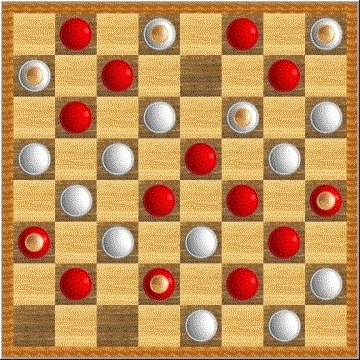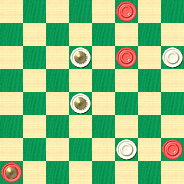The Checker Maven
Jump to navigationProblem Composition Contests Are Back!

Old-fashioned checker problem composition contests are back, thanks to the efforts of master problemist William J. (Bill) Salot.
If you're at all familiar with checker literature, you know that solving checker problems provides an essential means of improving your game. Time and again, the experts advise us make the solution of checker problems a regular part of our study routine.
But checker problems go far beyond mere didactic purposes. A fine problem provides exquisite pleasure to the solver, and gives a view into the depth and beauty of the game of checkers.
Composing a truly great problem, a "gem" if you will, combines both art and science, with much emphasis on art. Mr. Salot is such a modern-day artist, and his goal is to start a neo-renaissance in the enjoyment and composition of checker problems.
To this end, he's started a series of problem composition contests; they've been running monthly since January 2012, with the third such contest now in progress. The prize is the designation of "unofficial world champion" problem compositor. More details and problems and solutions for both the current and previous competitions can be found here. Be sure to check this out and cast your vote for the problem you think is best.
Don't miss out. The contest problems are elegant and entertaining. Some of them are truly astounding.
Mr. Salot was very kind in granting The Checker Maven an email interview. Mr. Salot also gave us a problem composed earlier in his career, which you'll find at the end of today's column. But first, let's talk with Mr. Salot for a little while.

What gave you the idea for the problem composition contests?
I had been composing, collecting, and publishing occasional checker problems for many years. Then I fell away from the game for a few decades. When I returned to the game a few years ago, I still had the problem composing bug. But there were far fewer places to publish problems, and apparently fewer problemists too. The current contests are just a natural revival of those conducted for several years beginning in the October 1969 ACF Bulletin. Whether they will uncover many “budding” problemists remains to be seen.
How would you characterize the response so far, both from the standpoint of problemists making submissions, and audience participation?
Using the Internet has proved to be a huge advantage over the old days when everything moved by “snail” mail. The audience response in terms of the number of judges has increased from 7 in a trial contest, to 12 in Contest #1, to 35 in Contest #2. We never had more than 6 judges before the Internet. The number of competing problemists is also growing, but not that fast. We would like to have more.
How did you get interested in composing problems?
As a beginner, I did not have frequent opportunities to play across the board. My few books each had a problem section in front of the games section. I reviewed the problems first. After that, the games in contrast seemed incomplete and largely incomprehensible. As a matter of curiosity, I found myself exploring options not covered in the games. Sometimes I could make the options more interesting by doctoring the positions. That was how I got into composing.
Can you tell us about your career as a problemist?
That so-called career would have disappeared early had I not subscribed to Willie Ryan’s highly entertaining American Checkerist magazine. I sent Ryan my first problem, he said it was a hit at the NYC Club and published it, probably because a “kid” composed it. That hooked me. My “career as a problemist” has been mostly sporadic. I spent some years helping Ernie Churchill produce “Churchill’s Compilations”; and some other years collecting problems, primarily those by George H. Slocum; but mostly I have been earning a living as a professional engineer (58 years and still counting) and raising a family (3 middle-aged kids and a grandson).
What advice might you have for the budding checker problemist?
Enjoy whatever facets of the game please you most, whether it be playing or chatting with friends nearby or on the Internet; participating in crossboard tournaments for prizes or fun; collecting or researching the literature; or analyzing positions with the aim of creating either a good cook or a good problem. If you want to open the door to problem composing, forget competition, relax and treat the challenge as a true artist. Learn to appreciate the artwork of others; then take all of the time necessary to create your own. Be both your own worst critic and your own best motivator. Never give up. The product may takes weeks, even months, but the process is uplifting, not drudgery. Check every crazy move, including backwards. Utilize a computer program; it can’t compose, but it can facilitate. Each composition is a learning experience toward making the next one better. Don’t listen if someone advises you, as I was advised, to take up tennis.
What do you think makes for a good checker problem?
That is what I have been trying to find out for more than 65 years. The answer is in the eyes of the beholder. Evaluation of contest problems is seldom unanimous. You favor one style. I favor another. Composers should always favor sound, dual-free problems that feel right, without regard to the style of problem. Abhor optional sequences; try to make every move a star.
Do problems have to be difficult to be good?
No, a single move can be good. Problems with very few moves have been called gems. The most difficult problem may not win a contest. Difficulty and beauty are not synonymous.
What do you think about problems aimed at beginning and intermediate players?
Many are needed and should be assimilated by beginners and intermediate players before advancing too far. Such problems would not fare well in a contest unless the contest did not include any advanced ones.
Is there a distinction here between "teaching" problems and "artistic" problems?
They probably overlap. “Teaching” to me implies a practical objective for use in a game; e.g., standard positions. “Artistic” problems that have arisen in games have a practical “teaching” attribute. But many “artistic” problems are unlikely or cannot possibly arise in a game; they probably “teach” nothing more than appreciation of the art. The distinction is not always obvious. Some very natural-appearing settings cannot arise in a game, while some extremely unnatural settings have.
Stroke problems sometimes evoke strong likes or dislikes. What's your opinion on stroke problems?
I have composed a couple of pure strokes of which I am very proud. Probably most composers have. Big pure strokes are very difficult to create without dual solutions or optional sequences. Accomplishing such perfection deserves more recognition than it usually gets. On the other hand, deferred strokes (Slocum strokes) are seldom disliked.
What do you see for the future of your problem contests?
Past problem composing contests have seldom lasted more then a few years unless they are widely spaced. The primary cause is composer exhaustion. The way the current contests are set up, the contest frequency can be varied to accommodate the arrival frequency of new problems. I can see the current contests becoming only annual events and still surviving.
Do you think checker problem composition has a bright future in general?
I think its future is linked to the future of the game itself. Together they have a synergy that should thrive for a good while. At my age, I don’t look too far into the future.
Anything else you'd like to say to Checker Maven readers?
I would like to see some of these things discussed more widely. But more importantly, I would like to pull more talented checkerists into the problemists’ arena. I believe they would thrive.
Thank you, Mr. Salot, for taking the time to talk with us. And now, as promised, here's one of Bill's problems.
BLACK

WHITE
White to Play and Win
W:B3,11,28,K29:WK10,12,K18,27.
Give it a try; it's just fine if you take your time and are a slo-poke yourself. When you're done, slo-ly poke your mouse on Read More to see the solution and Mr. Salot's problem notes.![]()
Solution
BLACK

WHITE
White to Play and Win
W:B3,11,28,K29:WK10,12,K18,27.
*27-24, 28-32, *24-20---A, 32-27, *18-14, 27-24, *14-9---B, 24-19, *9-6, 11-15, *6-2---C, 29-25, *2-7---D, 25-22,*20-16---E, 22-17, *7-11, 15-18, *10-6---F, 19-15, *11-7, 3-10, *16-11, White Wins.
A---Not 18-23, *32-28, 24-20, *28-24, Draws.
B---Not 10-6, *11-15, 14-10, *15-19, Draws.
C---Not 20-16, *29-25, 6-2, *15-18, 2-6, *3-8, Draws.
D---Not 20-16, *15-18, 2-6, *3-8, Draws.
E---Not 7-11, *15-18, Draws.
F---Not 11-15, *17-14, Draws.
You can email the Webmaster with comments on this article.
